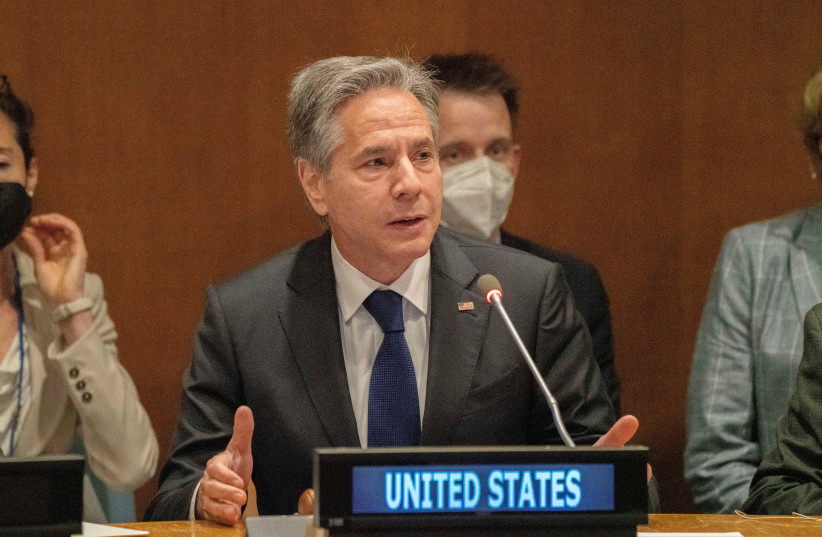An ancient spoon may not seem a likely subject of diplomatic catastrophe. Yet, in the short span of a week, the Biden Administration turned it into one, as it did with its comments about the Temple Mount and its adoption of the Turkish pronunciation of the country name.
With these forays into Middle East history and culture, the Biden Administration started off 2023 falling into the failed habits of prior administrations and broke new ground in ostracizing America’s allies.
These steps not only complicate any goodwill it seeks to make, whether with Israel or other allies in the region, but also risk undermining credible American engagement in the region.
Biden administration blunders
The latest move came on January 5, when the Biden administration handed over a 2,700-year-old spoon that was originally found in Hebron, located within the West Bank, where the Palestinian Authority is based. The modern Palestinian identity dates back to the 20th century and the spoon dates back to the Iron Age. And yet, the US official overseeing the handover described it as “an example of Palestinian cultural patrimony,” parroting a top Palestinian Authority talking point that falsely ties today’s Palestinian identity with the ancient Middle East.
Whoever used the spoon was likely not today’s Palestinians or their progenitors, so calling it their cultural patrimony is not true.

The US turning over a spoon may sound like a trivial matter but the Palestinian media quickly capitalized on the moment, describing it as “repatriat[ion]... to the Palestinian Authority,” implying the object validates the Palestinian roots in antiquity. The New York Times seized on this description, noting that this was “the first time the United States had repatriated a stolen relic to the Palestinian government.”
This moment comes atop other Biden administration blunders in Middle East history. The week began with a call on January 2, from Secretary of State Antony Blinken with his new Israeli counterpart, Eli Cohen. The brief readout filled with typical diplo-speak left out two key words, Abraham Accords. Instead, it concludes with the following sentence: “[t]he Secretary emphasized the continued US commitment to a two-state solution and opposition to policies that endanger its viability.”
The next day, Biden administration officials condemned Israel’s new Minister of National Security, Itamar Ben-Gvir, over his visit to the Temple Mount, saying that it was likely to provoke violence (a single rocket was fired from Gaza into Israel in response to the visit) and that it undermined the status quo of the site (it did not as the terms of the “status quo” arrangement do not prohibit visits by Jews to the site). Not only was this criticism inaccurate but it was also highly inappropriate for the US to publicly denounce a cabinet member from one of its closest allies for visiting an area that is legally part of his country.
False narratives
STATE DEPARTMENT spokesperson Ned Price and others in the administration trafficked in false narratives in voicing these criticisms and depicting the visit as a unilateral action to upend the status quo of the site. Not only was the criticism false but, as I noted in a tweet, it was also offensive, given that the Temple Mount is the holiest site for the Jewish people and Ben-Gvir’s visit coincided with the Jewish fast day of the 10th of Tevet, which marks the date of the Babylonian siege of the First Temple that led to its destruction.
Another less prominent moment happened on January 5, 2023, when the State Department conceded to the Turkish Embassy’s request to change references to their country from “Turkey” to “Türkiye” on all official US communications. In press reporting and official Turkish statements, the interest in changing the name ostensibly had to do with being confused with the festive bird eaten on Thanksgiving.
Again, although some might regard this as a trivial matter, several Turkey watchers noted another significant reason – Turkey’s presidential election this year. As Francesco Siccardi of Carnegie Europe explained, this change represents “another strategy deployed by the Turkish government to reach out to the nationalist voters in a crucial year for Turkish politics,” noting that this timing is crucial.
While linguistically correct, the name was described by Turkish President Recep Tayyip Erdogan in 2021 as the best representation and expression of the Turkish people’s culture, civilization, and values. Siccardi interpreted Erdogan’s push to change the name as intended to energize Turkish voters and turn their attention away from economic problems at home.
Indeed, instead of “Turkey” or “Republic of Turkey,” the State Department now uses the words “Türkiye” and “Republic of Türkiye.”
A Soviet saying goes “much harder than predicting the future is predicting the past.” In the same spirit, the Biden Administration is pushing fabricated narratives of other parties about the ancient and modern Middle East instead of building on the advances in the Middle East that took shape in its more recent history through the Abraham Accords.
In the Middle East, at least, history is not an academic exercise but is the language of diplomacy and warfare. Without clarity about American interests or those of America’s allies, the Biden Administration once again finds itself on the wrong side of history.
The writer is a historian of the Middle East who served as an adviser in the office of former US vice president Mike Pence. He currently serves as the director of the Center for American Security and of the center’s Middle East Peace Project at the America First Policy Institute.
